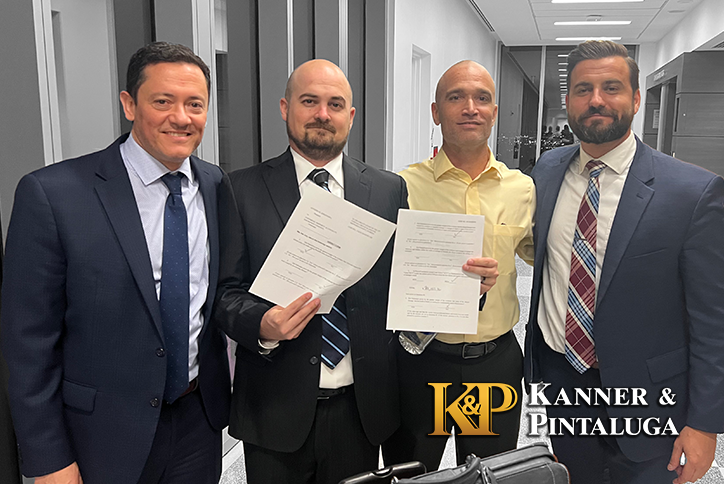
Verdicts & Settlements: $400,000 Settlement Reached in Rear-End Crash That Caused Multi-Vehicle Pileup
January 3, 2023
Verdicts & Settlements: Jury Awards Homeowner Nearly Four Times Amount Paid By Carrier For Burst Pipe Damages
January 13, 2023
Author: David Lipman, Esq., Chief Legal Officer | General Counsel, Kanner & Pintaluga
As lawyers, we often find ourselves in possession of funds that do not belong to us or our law firm. On occasion, there may be multiple parties, including the lawyer itself, that claim an interest in the trust funds. In those cases, the funds must be treated by the lawyer as trust property, with the caveat that the portion of the funds belonging to the lawyer or law firm or any other funds not in dispute must be disbursed within a reasonable time. Rule 5-1.1 of the Rules Regulating the Florida Bar requires a lawyer “(u)pon receiving funds or other property in which a client or third person has an interest” to notify those parties of receipt of the funds.
What Is A Lawyer’s Ethical Responsibility to a Client’s Judgment Creditor?
It’s a more nuanced question, but per Rule 5-1.1.(f) a lawyer may have a duty to protect the third-party against wrongful interference by its own client. In those situations when the third-party’s claim to the trust funds are not frivolous under applicable law, the lawyer must refuse to surrender the funds to the client until the claims are resolved. This unique situation creates the potential for conflict between the lawyer and its client so due care must be taken to protect the attorney-client relationship. The lawyer should not unilaterally determine who is the rightful owner of the disputed funds, but best practice would dictate that the disputed funds be deposited into the court registry so that the issue may be adjudicated.
The most common scenario involving a third-party’s claim to funds held in trust is when a lawyer deposits settlement funds as a result of a personal injury claim. In those instances, the client’s medical providers will claim an interest in the settlement funds now held in trust. Further, as noted above, occasionally the lawyer itself may have a claim to those funds and the client is now disputing. Rules 5-1.1(e) and (f) provide guidance and the lawyer should immediately notify the third-party claiming an interest in the funds advising them that the funds have now been deposited into the lawyer’s trust account. If the third-party, whether a medical provider, the lawyer itself, or a judgment creditor has a legal right to the funds held in trust, the lawyer itself has a legal duty to hold those funds until the dispute is resolved. However, whether or not the lawyers owes that legal duty to the third-party is a question of law and not an ethical question governed by the Rules Regulating the Florida Bar. The Rules do advise that a lawyer may serve as a negotiator on behalf of the client, but cannot unilaterally arbitrate the issue due to the lawyer’s duty to its client and the presumption that a lawyer cannot be adverse to its own client.
As lawyers, we know that we can never take action that is against our own client’s interests. That is an ethical principle that is axiomatic to the practice of law and one of the fundamental ethical rules governing lawyers. Should a lawyer be required to take action that is adverse to the client’s interests, the lawyer must contemplate its obligations under Rule 4-1.7 governing conflicts of interest. In some cases, a lawyer may be required to withdraw from the case as a result of the conflict absent an agreement by the parties involved in the dispute or an adjudication by a court of competent jurisdiction.
However, if a lawyer is confident that under the law certain action must be taken then in those rare situations the lawyer should take action adverse to its client, but only after fully advising the client of the intended action and the reasonable basis for taking the adverse action. Further, the lawyer should always advise the client that they have the right, and in fact should recommend, that the client seek independent legal counsel before any action is taken against the client’s interests. That would include the depositing of the disputed trust funds into the court registry to allow the court to adjudicate the dispute between the client and the third-party. At all times possible, the lawyer must act as an advocate on behalf of the client in resolving the dispute.
The Rules Regulating the Florida Bar and the caselaw on fiduciary duty provide that lawyers generally must protect trust funds that are legitimately in dispute and when the lawyer owes a legal duty to the third party claiming an interest. If the lawyer determines that the third-party does not have a valid legal claim, then ultimately the lawyer does not have a duty to protect the funds held in trust. However, if the third-party does have a valid legal claim, then a lawyer must walk an ethical tightrope between the conflict of interest rules, it’s fiduciary duty and it’s legal duty to third parties as to the disputed amount of the funds held in trust while simultaneously working to arbitrate, mediate or resolve the dispute via judicial disposition.
Get What you Deserve
Kanner & Pintaluga is an aggressive, ethical, and results-driven national plaintiff firm committed to representing accident, serious injury, and property damage victims. With a team of nearly 100 attorneys, we have the experience and expertise to achieve the most favorable outcome for our clients. If we can assist you or if you’d simply like to speak to an attorney about getting the help you need, please do not hesitate to contact us. Our team is always available to discuss your rights and make certain that you and your family are protected.

